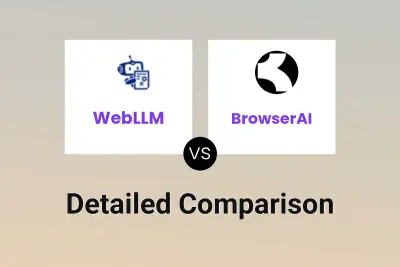 WebLLM
VS
WebLLM
VS
 BrowserAI
BrowserAI
WebLLM
WebLLM introduces a method for deploying and running large language models (LLMs) entirely on the client-side, directly within a web browser. Leveraging WebGPU for hardware acceleration, it addresses the challenges of server dependency and high computational costs typically associated with generative AI models. This approach allows developers to integrate powerful AI capabilities into web applications, offering benefits such as reduced operational expenses, enhanced user privacy as data processing occurs locally, and increased potential for personalization.
The engine provides robust functionality, including full compatibility with the OpenAI API standard, supporting features like JSON-mode, function-calling, and streaming for real-time interactions. WebLLM natively supports a wide array of popular open-source models, such as Llama, Phi, Gemma, and Mistral, and facilitates the integration of custom models in the MLC format. Integration into projects is streamlined through standard package managers (NPM, Yarn) or CDN links, complemented by comprehensive examples. It also supports Web Workers and Service Workers for optimizing performance and managing model lifecycles efficiently, along with capabilities for building Chrome extensions.
BrowserAI
BrowserAI is an open-source JavaScript library designed for running Large Language Models (LLMs) directly within the end-user's web browser. By utilizing WebAssembly and WebGPU technologies, it allows for efficient execution of increasingly sophisticated small language models client-side. This approach eliminates the need for server-side processing for certain AI tasks.
The primary benefits of using BrowserAI include enhanced privacy and reduced operational expenses. Since all processing occurs locally on the user's device, no sensitive data is transmitted or exposed to third parties, ensuring 100% privacy. Furthermore, it eliminates API fees and the costs associated with cloud infrastructure. Integration is streamlined, requiring only a few lines of code without the complexity of managing servers, API keys, or rate limits.
Pricing
WebLLM Pricing
WebLLM offers Free pricing .
BrowserAI Pricing
BrowserAI offers Free pricing .
Features
WebLLM
- In-Browser Inference: Leverages WebGPU for hardware-accelerated LLM operations directly within web browsers.
- Full OpenAI API Compatibility: Supports JSON-mode, function-calling, streaming, and more.
- Extensive Model Support: Natively supports models like Llama, Phi, Gemma, RedPajama, Mistral, Qwen, etc.
- Custom Model Integration: Allows integration and deployment of custom models in MLC format.
- Plug-and-Play Integration: Easy integration via NPM, Yarn, or CDN with examples.
- Streaming & Real-Time Interactions: Enables real-time output generation for interactive applications.
- Web Worker & Service Worker Support: Offloads computations for optimized UI performance and model lifecycle management.
- Chrome Extension Support: Enables building Chrome extensions using WebLLM.
BrowserAI
- Local LLM Execution: Runs Large Language Models directly in the browser via WebAssembly and WebGPU.
- Zero Operational Cost: Eliminates API fees and cloud infrastructure expenses.
- 100% Privacy: Ensures local processing with no data exposed to third parties.
- Effortless Integration: Simple setup with a few lines of code, no servers or API keys needed.
- Open Source: Available on GitHub for transparency and community contributions.
Use Cases
WebLLM Use Cases
- Developing privacy-focused personal AI assistants.
- Building cost-effective chatbot applications without server infrastructure.
- Creating interactive web applications with real-time LLM responses.
- Enhancing web browsers with custom AI functionalities via extensions.
- Integrating custom language models into client-side applications.
- Enabling offline AI capabilities within web applications.
BrowserAI Use Cases
- Developing privacy-centric AI applications.
- Integrating AI features without backend infrastructure costs.
- Creating personalized AI experiences running locally on user devices.
- Building applications requiring offline AI capabilities.
- Experimenting with small language models in browser environments.
Uptime Monitor
Uptime Monitor
Average Uptime
100%
Average Response Time
115.11 ms
Last 30 Days
Uptime Monitor
Average Uptime
99.85%
Average Response Time
209.5 ms
Last 30 Days
WebLLM
BrowserAI
Didn't find tool you were looking for?
